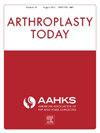Vaccination Status is Not Associated With Adverse Postoperative Outcomes Following Total Joint Arthroplasty in Patients With a Preoperative COVID-19 Diagnosis
IF 1.5
Q3 ORTHOPEDICS
引用次数: 0
Abstract
Background
Previous studies have shown that COVID-19 diagnosis increases rates of perioperative infection, readmission, and other complications following surgery. However, the effect of the COVID vaccine in such patients is unknown. We hypothesized that of the patients with COVID diagnosis, vaccinated patients with COVID-19 diagnosis would have lower rates of adverse complications compared to unvaccinated patients undergoing total joint arthroplasty (TJA).
Methods
Using a national database registry, patients aged less than 85 years undergoing elective primary total knee or total hip arthroplasty with at least 90 days of follow-up were included during the first year of COVID-19 pandemic from April 2020-April 2021. Patients were included in the COVID-19 cohort if they had a diagnosis on the day of surgery or within 30 days prior to surgery. Patients with a history of malignancy, joint injection, femoral neck fractures, tibial fractures, and those undergoing revision arthroplasty were excluded from the study. All comparisons were performed using multivariate logistic regression with significance set at P < .05. Odds ratio and 95% confidence interval were reported for all comparisons.
Results
There were a total of 1280 patients with COVID-19 diagnosis matched with 3831 patients without COVID-19 diagnosis. Patients with a COVID-19 diagnosis were at an increased risk of pneumonia, acute kidney injury, urinary tract infection, and readmission following TJA compared to patients without COVID-19 diagnosis. However, there were no differences in any complications assessed between vaccinated patients and unvaccinated patients with COVID-19 diagnosis following TJA.
Conclusions
This study confirms that patients with a COVID-19 diagnosis in the 30 days prior to TJA, whether vaccinated or not, have increased risks of medical complications and hospital utilization. However, this study demonstrates that vaccination status does not appear to be associated with the incidence of adverse postoperative events in patients with a COVID-19 diagnosis prior to TJA.
背景以前的研究表明,COVID-19 诊断会增加围手术期感染、再入院和手术后其他并发症的发生率。然而,COVID 疫苗对这类患者的影响尚不清楚。我们假设,在诊断出 COVID-19 的患者中,与未接种疫苗的全关节关节置换术(TJA)患者相比,诊断出 COVID-19 的接种疫苗患者的不良并发症发生率较低。方法利用国家数据库登记,在 COVID-19 大流行的第一年(2020 年 4 月至 2021 年 4 月),纳入年龄小于 85 岁、接受择期全膝关节或全髋关节置换术且随访至少 90 天的患者。如果患者在手术当天或手术前 30 天内确诊,则纳入 COVID-19 队列。有恶性肿瘤病史、关节注射、股骨颈骨折、胫骨骨折以及接受翻修关节置换术的患者不在研究范围内。所有比较均采用多变量逻辑回归法进行,显著性设定为 P < .05。结果共有 1280 名确诊为 COVID-19 的患者与 3831 名未确诊为 COVID-19 的患者进行了配对。与未确诊 COVID-19 的患者相比,确诊 COVID-19 的患者在 TJA 术后发生肺炎、急性肾损伤、尿路感染和再入院的风险更高。结论本研究证实,在 TJA 术前 30 天内诊断出 COVID-19 的患者,无论是否接种疫苗,其医疗并发症和住院风险都会增加。然而,本研究表明,接种疫苗的情况似乎与 TJA 前诊断出 COVID-19 的患者术后不良事件的发生率无关。
本文章由计算机程序翻译,如有差异,请以英文原文为准。
求助全文
约1分钟内获得全文
求助全文
来源期刊

Arthroplasty Today
Medicine-Surgery
CiteScore
2.90
自引率
0.00%
发文量
258
审稿时长
40 weeks
期刊介绍:
Arthroplasty Today is a companion journal to the Journal of Arthroplasty. The journal Arthroplasty Today brings together the clinical and scientific foundations for joint replacement of the hip and knee in an open-access, online format. Arthroplasty Today solicits manuscripts of the highest quality from all areas of scientific endeavor that relate to joint replacement or the treatment of its complications, including those dealing with patient outcomes, economic and policy issues, prosthetic design, biomechanics, biomaterials, and biologic response to arthroplasty. The journal focuses on case reports. It is the purpose of Arthroplasty Today to present material to practicing orthopaedic surgeons that will keep them abreast of developments in the field, prove useful in the care of patients, and aid in understanding the scientific foundation of this subspecialty area of joint replacement. The international members of the Editorial Board provide a worldwide perspective for the journal''s area of interest. Their participation ensures that each issue of Arthroplasty Today provides the reader with timely, peer-reviewed articles of the highest quality.
 求助内容:
求助内容: 应助结果提醒方式:
应助结果提醒方式:


